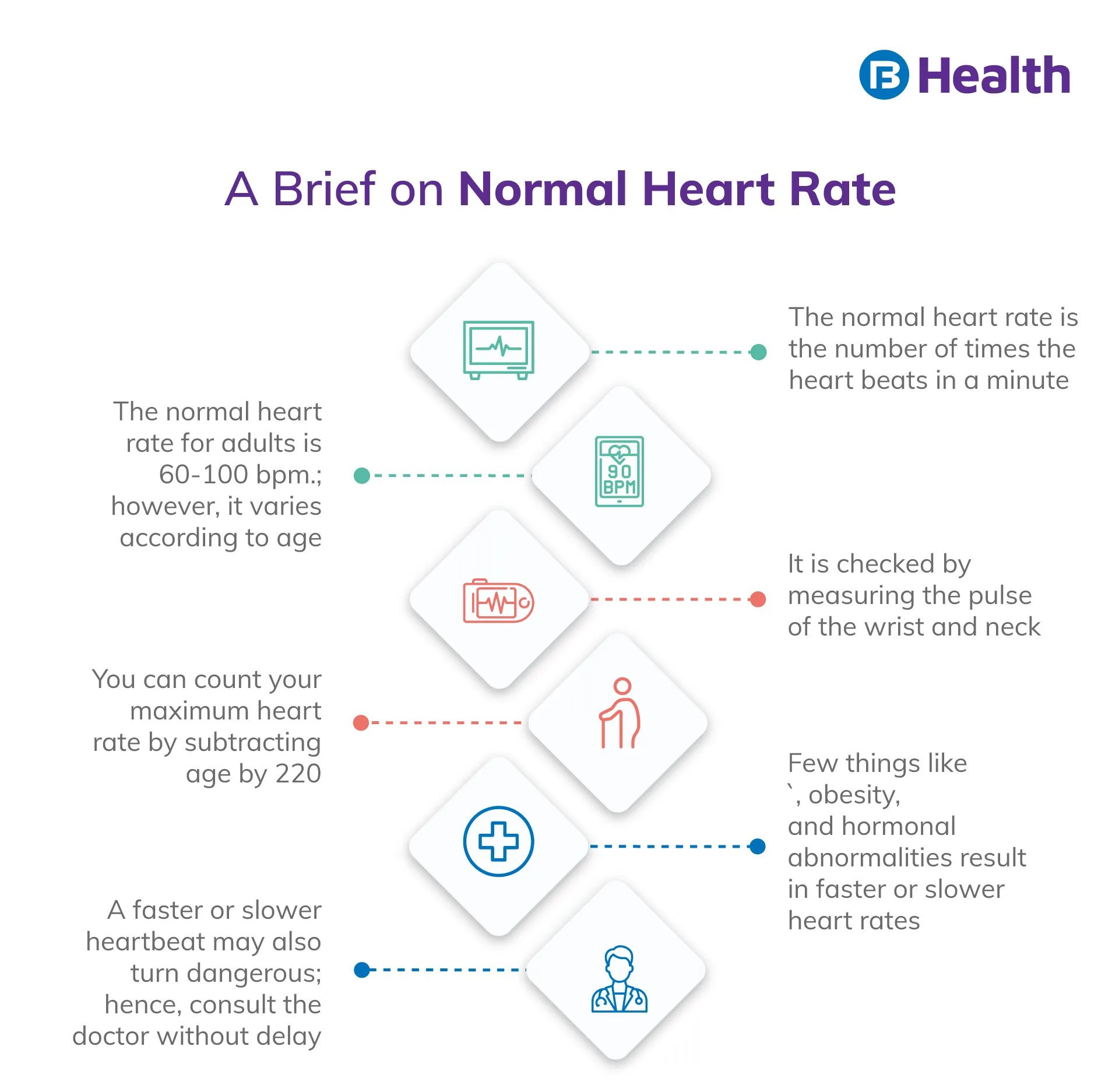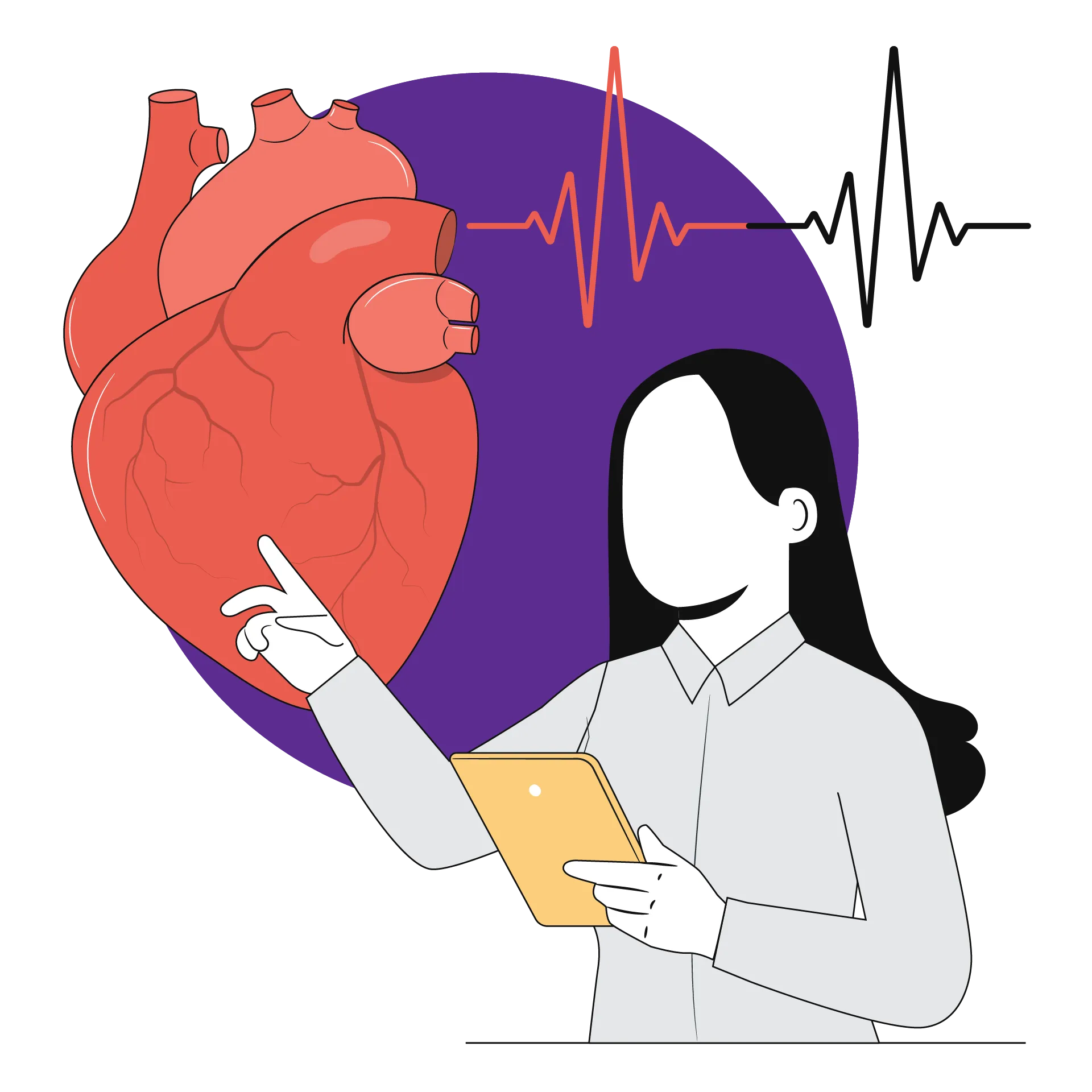Heart Health | 8 min read
What Is A Good Heart Rate For My Age?
Medically reviewed by
- Table of Content
Synopsis
A heart is also called the soul of the human body. For healthy living, proper functioning of the heart is essential. As the heart beats, oxygen-rich blood reaches all parts of the body. But how many times does a heartbeat and how important is it to have a normal heart rate?
Key Takeaways
- heart beats about 100000 times a day
- is measured by evaluating a person’s heart rate
- Heart rate is nothing but the number of times your heartbeat is in a minute
The heart rate may vary from person to person, and certain other factors like age also play a role in it. So a low heart rate doesn't always mean you are at risk of severe health conditions. However, information about heart rate may help to monitor your fitness level and warns you about developing health problems. Hence early detection may save your life. Check all the details of normal heart rate, range, and risk factors here.
What Is Your Heart Rate?
As already said, heart rate is the number of times your heart beats in a minute. People also refer to heart rate as the pulse. However, there is a difference between them. A heart rate specifies the number of times your heart beats, whereas a pulse refers to how you can feel your heart rate. The doctor usually uses the term pulse and uses it to understand the patient's heart condition. The heart rate may not remain the same every time. The human body automatically controls your heartbeat according to your surroundings and as per your activity. That's why your heart beats faster when you undergo emotional imbalance and drops when you are calm.
The heart rate is often measured when the person is relaxed. This measurement is known as resting heart rate. The normal heart rate ranges between 60-100 beats per minute for adults. It may vary according to age. However, heart rate is an important indicator that reports your overall health condition. The risk may occur if the heartbeat level turns out to be above or below normal heart rate. Therefore, stay with us to learn how you can measure your heart rate on your own and avoid critical situations.
How Do I Take My Heart Rate?
There are few places in the human body where the pulse rate can be found easily.
- The insides of the wrists
- The sides of the neck
Procedure to find the pulse in your neck:
Place your first finger (index) and middle finger on the side of the windpipe on your neck, under your jaw.
- Press the skin lightly and try to find your pulse
- Press a bit harder or move your finger around if you are unable to find the pulse
- Do not use your thumb in this process
Procedure to find the pulse in your wrist:
- Place the first finger and middle finger on the inside of your wrist at the base of your thumb
- Press your skin slightly to feel the pulse and move your fingers around. Once you find the pulse, you can figure out the pulse rate by counting the heartbeat for 60 seconds. Other methods are:
- Count the heartbeat rate for 10 seconds, then multiply the received number by 6
- Count the heartbeat rate for 15 seconds, then multiply the counted number by 4
- Count the heartbeat for 30 seconds, then multiply the received digit by two
A normal heart rate can be found using any of these methods. Figuring out the normal heartbeat rate after exercising helps to understand whether your exercise program suits you or not.

What Things Affect Heart Rate?
Here are a few things that may affect the heart rate:
Medications
The intake of certain medicines may affect the normal heart rate. Drugs such as beta-blockers slow heart rate, and too much thyroid medicine lead to a faster pulse.
Obesity
A person suffering from obesity may have a higher resting rate because the heart has to work harder to supply blood to all organs. It leads to a faster pulse rate.
Intake of caffeine and nicotine
Substances like tea, coffee, soda, and tobacco may raise the heart rate
Anemia
It is a condition that happens due to decreased red blood cells. Hence this situation tends the heart to beat faster to supply blood
Emotional imbalance
You may have witnessed increased heart rate when dealing with emotional imbalance. Stress, anxiety, and emotional breakdown lead to increased heart rate
Positions
According to a study, the heart rate gets faster for about 20 seconds when you suddenly move from sitting to standing
Smoking
A higher resting rate is visible in smokers. Hence it is advised to quit smoking as early as possible
Hormonal abnormalities
Hormonal imbalance may affect normal heart rate. Hyperthyroidism is a condition in which too much thyroid hormone is seen. This leads to an increased heart rate. Whereas hypothyroidism, a case of lower thyroid hormone, can result in decreased heart rate
Additional Read: How to manage hypertension
What Is Normal Heart Rate?
As already discussed, a normal heart rate ranges between 60 and 100 bpm. [1] However, some people may have a lower heart rate which is normal. This condition is visible in athletes. In a physically fit body, the heart doesn't have to work harder to supply blood to body parts. Hence heart rate may drop, which is normal. Here you can find the average heart rate categorized based on age and gender.
Find the details of normal heart rate by age here:
- The average heart rate for people of 18-20 age is 81.6
- The average heart rate for people of 21-30 age is 80.2
- The average heart rate for people between the age of 31-40 is 78.5
- The average heart rate for people between the age of 31-40 is 78.5
- The average heart rate for people of 41-50 age is 75.3
- The average heart rate for people of 51-60 age is 73.9
- The average heart rate for people between 61-70 age is 73.0
- The average heart rate for people of 71-80 age is 74.2
- The average heart rate for people over the age of 80 is 78.1
Here you can find a normal heart rate for women and a normal heart rate for men:
- The average heart rate for women is 78 to 82 bpm, and for men's is 70-72
How to Lower Your Resting Heart Rate?
The lower resting heart rate indicates that your heart is doing well. People who are physically active and relieved are more likely to have lower resting heart rates. Here are a few tips to reduce resting heart rate.
Eat in the right proportion
Try to have food only in the required quantity, or else this will lead to obesity. For example, it is observed that men who eat more fish have lower heart rates.
Smoking
Quit smoking as soon as possible. It is the unhealthiest practice that invites thousands of health problems.
Stress control
Stress is another reason which raises health issues in today's world. Too much worry also leads to a faster heart rate. Hence, take some time from your busy schedule to relax. Try meditation and breathing exercises to relieve the mind and body.
Exercise
Yes, exercise may indeed increase heart rate for a while. Although, regular exercise keeps your body fit and makes your heart stronger in the long run
Additional Read: Ayurvedic Medicines To Control High BPWhat is the Maximum Heart Rate?
The maximum heart rate is your highest pulse rate, especially during exercise.
You can measure it by subtracting your current age from 220. For example, a person of age 50 will have a maximum heart rate of 220-50= 170 bpm.
You can understand your actual highest heart rate count with the help of a graded exercise test. This value also gives an idea of whether you are doing an intense workout or not.
What is a Dangerous Heart Rate?
A dangerous heart rate is a condition in which your heart rate may go far above normal heart rate or slow below 60 bpm. It may also result in severe cardiac conditions. Here are a few health conditions resulting in higher and lower heart rates.
Tachycardia:
In this condition, the heart rate is constantly above 100 bpm for a certain period. Symptoms such as dizziness and weakness are common. It occurs due to the following reasons:
- Smoke
- Over intake of caffeine and alcohol
- Stress and Anxiety
- Due to certain medications like decongestants
- Hormonal imbalance and other health conditions
Bradycardia:
It is a condition in which your heart rate drops below 60 bpm. The cause of bradycardia includes:
- Health problems like thyroid
- Side effects from medicines
- Sleep apnea
Additional Read: Lifestyle Changes to Help You Manage Hypertension
If these conditions are not treated in the preliminary stages, they may lead to severe heart problems. Hence, visit the doctor if the fluctuating heart rate is frequent. The cardiologist prescribes an ECG test and Cardiac Risk Markers test to test for heart Arrhythmia.The heart is the primary organ of the human body. Therefore, it is necessary to pay attention to heart health. However, a healthy lifestyle and little knowledge about your health condition are enough to maintain a normal heart rate.
If you don't have a normal heart rate, start looking for an expert's opinion. Try visiting Bajaj Finserv Health to talk to professionals at your convenience from any location. If you suffer from heart disease, don't forget to keep a heart test report while consulting. Start a healthy lifestyle to have a healthy heart!
- References
- https://www.nhs.uk/conditions/postural-tachycardia-syndrome/#:~:text=Postural%20tachycardia%20syndrome%20(PoTS)%20is,as%20postural%20orthostatic%20tachycardia%20syndrome.
- Disclaimer
Please note that this article is solely meant for informational purposes and Bajaj Finserv Health Limited (“BFHL”) does not shoulder any responsibility of the views/advice/information expressed/given by the writer/reviewer/originator. This article should not be considered as a substitute for any medical advice, diagnosis or treatment. Always consult with your trusted physician/qualified healthcare professional to evaluate your medical condition. The above article has been reviewed by a qualified doctor and BFHL is not responsible for any damages for any information or services provided by any third party.




